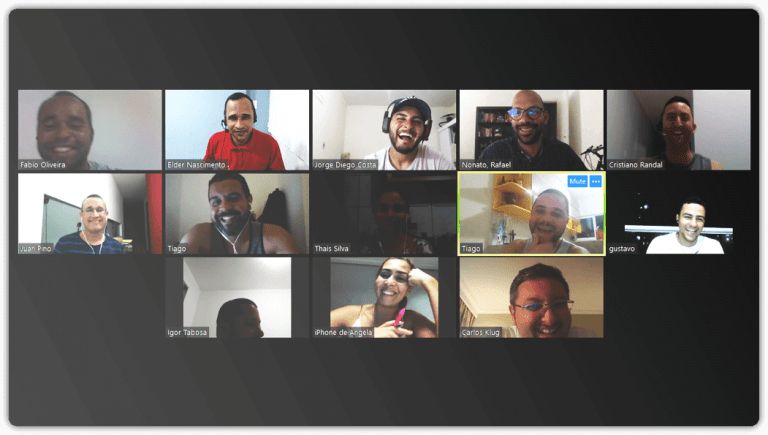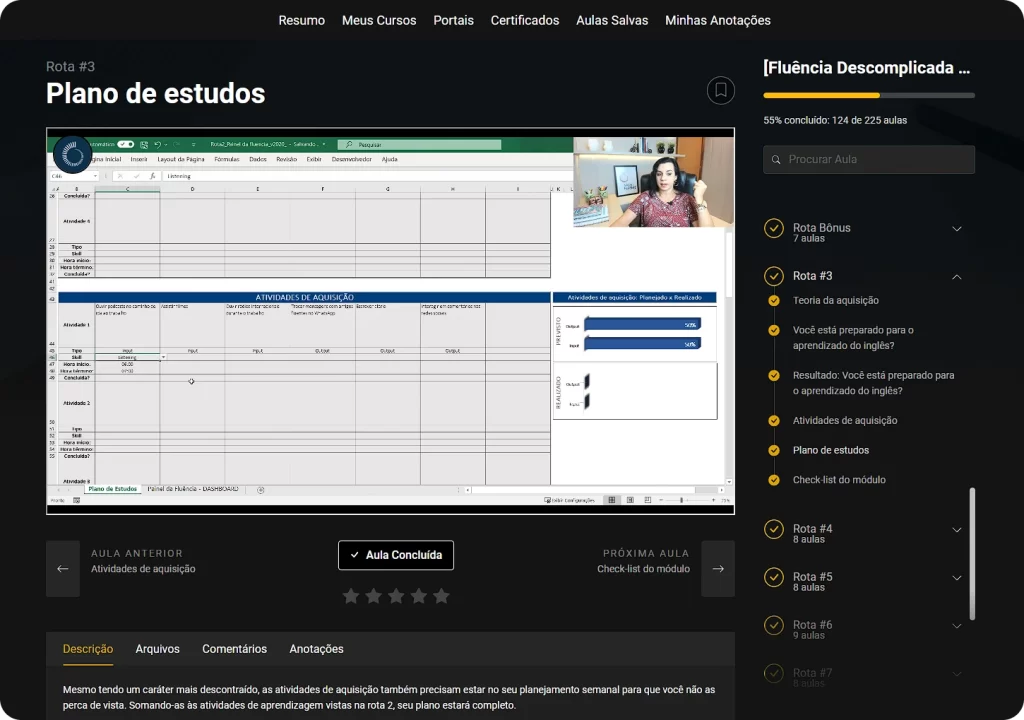Phrasal verbs, também conhecidos como expressões verbais, são verbos que, ao serem combinados com partículas adverbiais ou preposições, têm seus significados modificados.
Comunicar-se com falantes nativos de inglês significa que você ouvirá phrasal verbs com frequência, e se você não estiver preparado, você pode ficar confuso rapidinho, já que o grande pega ratão desses verbos especiais é que eles não podem ser traduzidos ao pé da letra, na maioria das vezes.
Pensando nisso, eu trouxe aqui uma lista com nada mais, nada menos do que 40 desses queridinhos e com exemplos para você entender – de nada!
- Branch out: ampliar ou estender os interesses
- The supermarkets have branched out into banking.
- [Os supermercados ampliaram seus serviços para o ramo bancário.]
- Break into: entrar (com esforço ou força)
- It’s always been his ambition to break into broadcasting.
- [Sempre foi sua ambição entrar no ramo de transmissão.]
- Carry on: continuar
- He moved to New York to carry on his work.
- [Ele mudou-se para Nova York para continuar seu trabalho.]
- Close down: encerrar as operações
- The firm has decided to close down its Chicago branch.
- [A empresa decidiu encerrar sua filial em Chicago.]
- Look forward to: aguardar com prazer
- We look forward to hearing from you soon.
- [Aguardamos ansiosos por uma resposta sua em breve.]
- Note down: anotar
- Her answers were noted down on the chart.
- [Suas respostas foram anotadas no gráfico.]
- Step down: renunciar ou deixar um cargo/trabalho
- The chairman was forced to step down due to ill health.
- [O presidente foi forçado a renunciar devido a problemas de saúde.]
- Take off: tornar-se bem-sucedido ou popular muito rápido
- Her business has really taken off.
- [Seu negócio realmente decolou.]
- Take up: ocupar uma quantidade específica de espaço ou tempo
- These files take up a lot of disk space.
- [Esses arquivos ocupam muito espaço no disco.]
- Weigh up: considerar
- You should weigh up the advantages and disadvantages of each type before buying.
- [Você deve considerar as vantagens e desvantagens de cada tipo antes de comprar.]
- Back up: fazer uma cópia das informações
- It’s a good idea to back up your files onto a memory stick. [É uma boa ideia fazer uma cópia dos seus arquivos em um pen drive.]
- Carry out: realizar uma tarefa
- The building work was carried out by a local contractor.
- [A obra foi realizada por um empreiteiro local.]
- Come up: acontecer ou surgir
- I’m going to have to cancel our meeting – something’s come up.
- [Vou ter que cancelar nossa reunião – algo surgiu.]
- Get on: continuar ou começar a fazer algo
- She told us to get on with our work.
- [Ela nos disse para continuar nosso trabalho.]
- Keep up with: acompanhar
- We try to keep up with what’s happening about finacial news.
- [Tentamos acompanhar o que está acontecendo com as notícias financeiras.]
- Set up: iniciar (um negócio)
- The group plans to set up an import business.
- [O grupo planeja iniciar um negócio de importação.]
- Go through: passar por algo ruim
- We can’t really imagine what our company’s going through.
- [Realmente não podemos imaginar o que nossa empresa está passando.]
- Find out: descobrir um fato ou uma informação
- Can you find out what our customers think of their local bus service?
- [Você pode descobrir o que nossos clientes acham do serviço de ônibus local?]
- Call off: cancelar algo
- With the weather worsening, they have called off their field trip.
- [Com o clima piorando, eles cancelaram a excursão.]
- Call back: retornar a ligação para alguém
- I’ll call you back when I’ve heard something about interview.
- [Eu vou ligar de volta quando souber algo sobre a entrevista.]
- Deal with: lidar com um problema
- I spent the morning dealing with my emails.
- [Passei a manhã lidando com meus e-mails.]
- Drop in: fazer uma visita curta a algum lugar
- I will drop in tomorrow morning.
- [Vou dar uma passada amanhã de manhã.]
- Fill out: preencher (um formulário)
- It took me several hours to fill out the application form.
- [Levei várias horas para preencher o formulário de inscrição.]
- Hold on: esperar
- We’ll hold on another minute, then we’ll have to go.
- [Vamos esperar mais um minuto, depois teremos que ir.]
- Join in: participar
- We would be eager to join in projects of that sort.
- [Estaríamos ansiosos para participar de projetos desse tipo.]
- Lay off: Demitir (funcionários)
- They’ve had to cut back production and lay off workers.
- [Eles tiveram que reduzir a produção e demitir funcionários.]
- Put back: adiar ou postergar
- The meeting has been put back to next week.
- [A reunião foi adiada para a próxima semana.]
- Run out of: ficar sem algo
- Many companies are running out of money.
- [Muitas empresas estão ficando sem dinheiro.]
- Sort out: organizar
- I need to sort out the mess on my desk.
- [Preciso organizar a bagunça na minha mesa.]
- Take on: empregar (funcionários)
- We’re not taking on any new staff at the moment.
- [Não estamos empregando novos funcionários no momento.]
- Take over: tomar o controle de algo
- IBM is taking over the smaller company.
- [A IBM está assumindo o controle da empresa menor.]
- Bail out: resgatar alguém de uma situação difícil, especialmente problemas financeiros
- Some local businesses have offered to bail out the museum.
- [Algumas empresas locais oferecerram resgate para o museu.]
- Cut back: reduzir algo
- Several major hospitals are cutting back on staff at the moment.
- [Vários grandes hospitais estão reduzindo sua equipe no momento.]
- Go under: ir à falência
- The firm will go under unless business improves.
- [A empresa irá à falência se os negócios não melhorarem.]
- Fall through: fracassar
- The planned purchase of the racecourse fell through.
- [A compra planejada do hipódromo fracassou.]
- Pull out: se afastar de algo ou parar de se envolver com isso
- The project became so expensive that we had to pull out.
- [O projeto ficou tão caro que tivemos que nos afastar.]
- Bottom out: parar de piorar
- There are signs that the recession has bottomed out.
- [Há sinais de que a recessão atingiu o fundo do poço.]
- Level off: parar de subir ou cair e se tornar constante
- Inflation has begun to level off.
- [A inflação começou a se estabilizar.]
- Follow up: continuar a se comunicar com alguém após um evento
- You should follow up your phone call with an email or a letter.
- [Você deve seguir sua ligação telefônica com um e-mail ou carta.]
- Wrap up: finalizar um evento ou atividade
- Let’s wrap up this meeting so we can go to lunch.
- [Vamos encerrar esta reunião para podermos almoçar.]
É isso aí! Curtiu a lista? Espero que você não apenas tenha gostado como se envolva com esses phrasal verbs. É sério, eles serão bem úteis para você e, quando você passar a usá-los, seu inglês vai soar muito mais natural.




